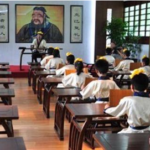Maria Helena Cruz Pistori, Associate Editor of Bakhtiniana, Post-Doctorate Pontifícia Universidade Católica de São Paulo (PUC-SP), São Paulo, SP, Brazil.
Paulo Rogério Stella, Foreign Languages Executive Editor of Bakhtiniana, Universidade Federal de Alagoas – UFAL; Post-Doctorate – Pontifícia Universidade Católica de São Paulo (PUC-SP), São Paulo, SP, Brazil.
 In the new issue of Bakhtiniana (17.4), the first two articles, of which theme refers to the body, draw the reader’s attention, as both have the work of Mikhail Bakhtin as their theoretical and methodological foundation. The first is entitled Body and Transgression in Bakhtin and Bataille: a Debate of Excesses and is written by Anderson Lopes da Silva (USP/CNPq Research Group Languages and Discourses in the Media, São Paulo, Brazil; Nucleus of Studies in Serial Fiction and Audiovisualities, UFPR, Curitiba, Paraná, Brazil).
In the new issue of Bakhtiniana (17.4), the first two articles, of which theme refers to the body, draw the reader’s attention, as both have the work of Mikhail Bakhtin as their theoretical and methodological foundation. The first is entitled Body and Transgression in Bakhtin and Bataille: a Debate of Excesses and is written by Anderson Lopes da Silva (USP/CNPq Research Group Languages and Discourses in the Media, São Paulo, Brazil; Nucleus of Studies in Serial Fiction and Audiovisualities, UFPR, Curitiba, Paraná, Brazil).
Lopes da Silva starts from some aspects common to the thinking of both philosophers – Russian and French, such as highlighting notions of ambiguity, ephemerality, and ambivalence of excess in the production of meanings, to address the way they see the body in their works. The author seeks to show how, in their own fields and sharing views that are sometimes similar and other times different, they are based especially on aspects of political and aesthetic excess in understanding corporeality, not only referring to cognitive but also to sensibility.
Another important aspect addressed by Lopes da Silva is the dialogue the author proposes between Bakhtin and Bataille regarding the role of “transgression as a temporary suspension of the rules” in the reflection on how to overcome interdictions and barriers related to corporeality in the social fabric. In this sense, Lopes da Silva recalls the processes of carnivalization as understood in the Bakhtinian work, stating that
within the processes of carnivalization, moralizing issues have their importance lowered and the lightness, the comic and the grotesque are seen as something appreciable; they are not condemned, but, on the contrary, are elevated to the level of naturalization of life (Lopes da Silva, 2022, p.12).
Anderson Lopes da Silva weaves in detail the dialogic threads between carnivalization and transgression to approach the notions of body and transgression in the chosen philosophers, and this can be seen in the reading of the article. Such reading can also be especially motivating in understanding the text that follows, a dialogical analysis of the male homosexual body.
Figure 1. “Is there anything better than a chubby man???”
Rafael Lira Gomes Bastos (UFC) signs The Disputes Regarding Meanings of the Homosexual Male Body Characterized as Bear: an Example of Dialogic Analysis. From a very contemporary perspective, Bastos addresses a social identity issue of ever-increasing importance: homosexuality. The dialogical analysis that he undertakes shows a discursive dispute in the description and naming of the gay body, in an almost always ironic and critical tone, in a closed Facebook community.
Bastos theoretically and methodologically bases his analysis on important passages of Bakhtin’s work that show the interrelation between alterity – body – and value, as in the words below:
Thus, “the body is not something self-sufficient: it needs the other, needs his recognition and his form-giving activity.” (BAKHTIN, 1990, p.51, emphasis in original). This way, however, it is not given in advance, but constituted by the social evaluations, by values. Bakhtin affirms, “it is as if rays of light radiate from my uniqueness and, passing through time, they confirm historical mankind, they permeate with the light of value all possible time and temporality itself as such, for I myself actually partake in temporality” (BAKHTIN, 1993, p. 60) (Bastos, 2022, p.41).
In the end, the author defends the theoretical-methodological contribution of Dialogical Discourse Analysis in the interpretation of issues related to gender and sexuality, a position that these articles corroborate and Dick McCaw (University of London) complements by stating something of which scholars are not always totally aware: “for his entire career, Bakhtin wrote about the human body, from his first more philosophical texts to his magnum opus on Rabelais” (2021, p.57).
Referências
BAKHTIN, M. Author and Hero in Aesthetic Activity. In: BAKHTIN, M. Art and Answerability. Edited by Vadim Liapunov and Michael Holquist; translated by Vadim Liapunov. Austin, TX: University of Texas Press, 1990.
BAKHTIN, M. O autor e o herói. In: BAKHTIN, M. Estética da criação verbal. Tradução do francês por Maria Ermantina Galvão G. Pereira. Revisão da tradução Marina Appenzeller. 2. ed. São Paulo: Martins Fontes, 1997.
BAKHTIN, M. Para uma filosofia do ato responsável. Tradução aos cuidados de Valdemir Miotello e de Carlos Alberto Faraco. São Carlos: Pedro & João Editores, 2017.
MCCAW, D. Por uma filosofia do corpo em movimento. In: BRAIT, B. and GOLÇALVES, J. C. Bakhtin e as artes do corpo. Tradução Larissa Cavalcanti. São Paulo: Hucitec, 2021.
Para ler os artigos, acesse
SILVA, A.L. Body and Transgression in Bakhtin and Bataille: A Debate of Excesses. Bakhtiniana: Revista de Estudos do Discurso [online]. 2022, vol. 17, no. 4, pp. 9-34 [viewed 23 December 2022]. https://doi.org/10.1590/2176-4573p57769. Available from: https://www.scielo.br/j/bak/a/NQRdTznFxmd77hySpBWRJwH/abstract/?lang=en
BASTOS, R.L.G. The Disputes Regarding Meanings of the Homosexual Male Body Characterized as Bear: An Example of Dialogic Analysis. Bakhtiniana: Revista de Estudos do Discurso [online]. 2022, vol. 17, no. 4, pp. 35-56 [viewed 23 December 2022]. https://doi.org/10.1590/2176-4573p58121. Available from: https://www.scielo.br/j/bak/a/gLZPrztS4f5dW7MKzSMVYrM/abstract/?lang=en
Links externos
Bakhtiniana. Revista de Estudos do Discurso – BAK: https://www.scielo.br/j/bak/
Como citar este post [ISO 690/2010]:

















Recent Comments